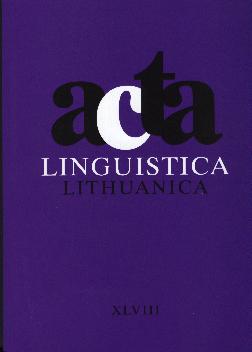Būdvardžio derinimas ir būdvardžio bevardės giminės problema
Adjectival agreement and the problem of neuter adjectives in Lithuanian
Author(s): Loreta SemėnienėSubject(s): Language and Literature Studies
Published by: Lietuvių Kalbos Institutas
Keywords: Lithuanian; agreement; adjectives; neuter gender
Summary/Abstract: In this article, different approaches to the problem of the neuter forms of Lithuanian adjectives are discussed and an attempt is made to define the principles underlying gender agreement. Departing from the tradition of Lithuanian grammar, where agreement is viewed as one of the types of syntactic relationship, the author considers agreement to be a purely formal relationship between words. The notions of controller gender and target gender are introduced. For the purpose of the description of gender agreement, substantivized adjectives, which function as agreement controllers, are set apart from non-substantivized ones. The neuter forms of the former are marked for animacy and opposed to animate masculine and feminine forms. Non-substantivized adjectives can only be agreement targets. Their neuter forms agree with neuter (inanimate) controllers (substantivized adjectives, pronouns etc.) and are also used as default agreement forms.
Journal: Acta Linguistica Lithuanica
- Issue Year: 2003
- Issue No: 48
- Page Range: 119-136
- Page Count: 13
- Language: Lithuanian

